5 jan 2019
|
|
The livestock sector in Khirbet Atouf in the northern Jordan Valley is suffering heavy losses due to the aggressive practices of Israeli soldiers and settlers, as well as the neglect and lack of support by the Palestinian Authority.
Head of Atouf's village council Ahmad Bsharat told the PIC reporter that the village is constantly attacked by Israeli soldiers and settlers who aim to force the residents out of the area. Israeli soldiers and settlers on a regular basis carry out drills and break-ins in Atouf, block Palestinian construction activities, seize Palestinian property, or destroy Palestinian crops, he added. |
Rich lands
Bsharat complained that, despite being rich in crops, Atouf's lands are neglected by all Palestinian official bodies, including the Ministry of Agriculture.
Deputy head of Atouf's village council, Abdullah Bsharat, said that there are 11 water wells in the area. Only five of them are used. He said that water is sold at high prices putting so much burden on those working in the agriculture and livestock sectors.
Abdullah Bsharat said that the Palestinian Ministry of Agriculture is required to play a significant role in protecting and supporting Palestinian farmers through many ways, one of which is providing proper marketing for their products.
The Palestinian farmers' losses have increased during the past month after the Israeli occupation forces destroyed many water lines which were the main source of water for over 22 families in Atouf.
Harassment
Representative of livestock owners in Atouf, Lutfi Bani Ouda, said that the farmers are facing great difficulties in raising livestock, pointing out that the number of livestock in Ras al-Ahmar area fell from 20,000 to 17,000 because of the Israeli harassment.
According to Bani Ouda, about 75 Palestinian families are living in Atouf. Most of them are livestock owners.
Bani Ouda said that Atouf's farmlands are almost daily targeted with raids and demolition notices. Farmers are sometimes interrogated, arrested, prevented from entering their own lands, or ordered to pay high fines.
He noted that vast tracts of Palestinian-owned lands in Atouf are used for military drills by the Israeli occupation army.
Israeli settlers' attacks are another nightmare, Bani Ouda added. The settlers destroy their crops and their bags of wheat, flour, and barley, and mix them with animal dung.
The Palestinian farmer Jamal Bsharat protested the absence of support for the marketing of their livestock products, especially after the door was widely opened for sheep imports, which has adversely affected the local market.
He said that cheese is purchased from Atouf's farmers for 9 NIS and sold in city markets for nearly 20 NIS. The larger part of the profits goes to traders.
Bsharat complained that, despite being rich in crops, Atouf's lands are neglected by all Palestinian official bodies, including the Ministry of Agriculture.
Deputy head of Atouf's village council, Abdullah Bsharat, said that there are 11 water wells in the area. Only five of them are used. He said that water is sold at high prices putting so much burden on those working in the agriculture and livestock sectors.
Abdullah Bsharat said that the Palestinian Ministry of Agriculture is required to play a significant role in protecting and supporting Palestinian farmers through many ways, one of which is providing proper marketing for their products.
The Palestinian farmers' losses have increased during the past month after the Israeli occupation forces destroyed many water lines which were the main source of water for over 22 families in Atouf.
Harassment
Representative of livestock owners in Atouf, Lutfi Bani Ouda, said that the farmers are facing great difficulties in raising livestock, pointing out that the number of livestock in Ras al-Ahmar area fell from 20,000 to 17,000 because of the Israeli harassment.
According to Bani Ouda, about 75 Palestinian families are living in Atouf. Most of them are livestock owners.
Bani Ouda said that Atouf's farmlands are almost daily targeted with raids and demolition notices. Farmers are sometimes interrogated, arrested, prevented from entering their own lands, or ordered to pay high fines.
He noted that vast tracts of Palestinian-owned lands in Atouf are used for military drills by the Israeli occupation army.
Israeli settlers' attacks are another nightmare, Bani Ouda added. The settlers destroy their crops and their bags of wheat, flour, and barley, and mix them with animal dung.
The Palestinian farmer Jamal Bsharat protested the absence of support for the marketing of their livestock products, especially after the door was widely opened for sheep imports, which has adversely affected the local market.
He said that cheese is purchased from Atouf's farmers for 9 NIS and sold in city markets for nearly 20 NIS. The larger part of the profits goes to traders.

The Israeli newspaper, Haaretz, has affirmed that Israel is seeking to resolve the fate of the northern Jordan Valley by systematically expelling the native residents from their homes and gradually annexing their areas.
In a report published on its website on Friday, Haaretz said that the Israeli army displaced last week the residents of Khirbet Ibzik village from their homes and destroyed their property and cultivated fields during military drills.
In the past month alone, the residents of this little community were ordered to abandon their crude homes multiple times.
Aref Daraghmeh, a field researcher for the human rights organization B’Tselem, the Bedouin communities in the northern Jordan Valley had been ordered to evacuate their homes at least 100 times in the past five years, adding that the shortest eviction lasted five hours and the longest 24 hours.
Over the past three months, the Israeli army had destroyed several Bedouin communities in the northern Jordan Valley and dismantled many renewable energy and infrastructure projects financed by the European Union for the local residents there.
In a report published on its website on Friday, Haaretz said that the Israeli army displaced last week the residents of Khirbet Ibzik village from their homes and destroyed their property and cultivated fields during military drills.
In the past month alone, the residents of this little community were ordered to abandon their crude homes multiple times.
Aref Daraghmeh, a field researcher for the human rights organization B’Tselem, the Bedouin communities in the northern Jordan Valley had been ordered to evacuate their homes at least 100 times in the past five years, adding that the shortest eviction lasted five hours and the longest 24 hours.
Over the past three months, the Israeli army had destroyed several Bedouin communities in the northern Jordan Valley and dismantled many renewable energy and infrastructure projects financed by the European Union for the local residents there.
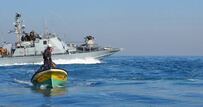
The Israeli occupation forces (IOF) on Saturday morning opened fire at Palestinian farmers and fishermen in the Gaza Strip.
According to local sources, Israeli soldiers opened fire at some fishermen as they working their land in the east of Qarara town, north of Khan Younis in southern Gaza.
Israeli gunboats also opened machinegun fire at Palestinian fishing boats off the shores of Khan Younis and Rafah in southern Gaza.
Luckily, no one was hurt in the shooting attacks.
According to local sources, Israeli soldiers opened fire at some fishermen as they working their land in the east of Qarara town, north of Khan Younis in southern Gaza.
Israeli gunboats also opened machinegun fire at Palestinian fishing boats off the shores of Khan Younis and Rafah in southern Gaza.
Luckily, no one was hurt in the shooting attacks.
3 jan 2019
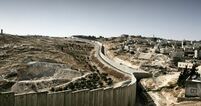
Israel has drastically reduced the number of Palestinian farmers who are allowed to work their lands located between the separation barrier or wall and the Green Line, according to Israeli official data.
According to Haaretz newspaper, in 2018, 72 percent of Palestinian requests for farming permits were rejected, compared to 24 percent in 2014.
There are also very few permits issued for relatives of the plot owner who work with him and paid laborers.
This information was sent by the Israeli army’s civil administration to Hamoked—the center for the defense of individual human rights—in response to a freedom of information law request, according to the newspaper.
However, that information lacks valuable data concerning, for example, the number of seasonal, short term permits which Hamoked believes often replace the long term permits.
The statistics correspond to reports submitted by farmers to Hamoked, to Machsom Watch activists and to Haaretz about bureaucratic obstacles that have been added over the past four years to get the permits to cultivate their land.
The land between the barrier and the Green Line, which Israel refers to as the “seam zone,” totals 137,000 dunums (33,853 acres), a report released by Haaretz pointed out.
Since the start of 2018 through November 25, the civil administration approved only 1,876 requests for farming permits of the 7,187 requests submitted, which constitutes an unprecedented refusal rate of 72 percent. This compares to a refusal rate of 24 percent in 2014, when the number of requests totaled 4,288, and the number of permits issued was 3,221.
Hamoked, has been assisting farmers who are denied permits since 2009, said the obtained data confirm that “contrary to the high court of justice ruling that recognizes the residents’ right to work their lands with their families and employees, the army is acting systematically to deprive the Palestinians of this basic right, to restrict the entry of Palestinian farmers into the seam zone and to gradually dispossess them of their land.”
According to Haaretz newspaper, in 2018, 72 percent of Palestinian requests for farming permits were rejected, compared to 24 percent in 2014.
There are also very few permits issued for relatives of the plot owner who work with him and paid laborers.
This information was sent by the Israeli army’s civil administration to Hamoked—the center for the defense of individual human rights—in response to a freedom of information law request, according to the newspaper.
However, that information lacks valuable data concerning, for example, the number of seasonal, short term permits which Hamoked believes often replace the long term permits.
The statistics correspond to reports submitted by farmers to Hamoked, to Machsom Watch activists and to Haaretz about bureaucratic obstacles that have been added over the past four years to get the permits to cultivate their land.
The land between the barrier and the Green Line, which Israel refers to as the “seam zone,” totals 137,000 dunums (33,853 acres), a report released by Haaretz pointed out.
Since the start of 2018 through November 25, the civil administration approved only 1,876 requests for farming permits of the 7,187 requests submitted, which constitutes an unprecedented refusal rate of 72 percent. This compares to a refusal rate of 24 percent in 2014, when the number of requests totaled 4,288, and the number of permits issued was 3,221.
Hamoked, has been assisting farmers who are denied permits since 2009, said the obtained data confirm that “contrary to the high court of justice ruling that recognizes the residents’ right to work their lands with their families and employees, the army is acting systematically to deprive the Palestinians of this basic right, to restrict the entry of Palestinian farmers into the seam zone and to gradually dispossess them of their land.”

The Union of Agricultural Work Committees (UAWC) has belittled any Israeli decision to increase the area of fishing in Gaza waters, describing such step, if happened, as a snare to be used by the Israeli occupation state to arrest more Palestinian fishermen and seize their boats.
In remarks to the Palestinian Information Center (PIC) on Wednesday, UAWC official Zakariya Baker said that the Palestinian side did not receive any official decision from the Israelis about expanding the permitted fishing range off the coast of Gaza.
“Expanding the fishing range to 12 nautical miles from the Gaza Valley to Rafah is only a small area not exceeding five kilometers,” Baker affirmed, adding that the fishermen needs sufficient space in which to move freely in order to look for fish.
“When the occupation announced yesterday about expanding the fishing zone [in Gaza] through its media without informing us officially, it arrested a fisherman and his son as they were fishing. How come?” he said.
In remarks to the Palestinian Information Center (PIC) on Wednesday, UAWC official Zakariya Baker said that the Palestinian side did not receive any official decision from the Israelis about expanding the permitted fishing range off the coast of Gaza.
“Expanding the fishing range to 12 nautical miles from the Gaza Valley to Rafah is only a small area not exceeding five kilometers,” Baker affirmed, adding that the fishermen needs sufficient space in which to move freely in order to look for fish.
“When the occupation announced yesterday about expanding the fishing zone [in Gaza] through its media without informing us officially, it arrested a fisherman and his son as they were fishing. How come?” he said.

Israeli authorities ordered a halt on the construction of a Palestinian home and a green house in the southern West Bank town of Nahhalin, in the Bethlehem district, on Wednesday.
Deputy Mayor of Nahhalin,Hani Fanoun, told WAFA that Israeli forces delivered a halt on construction notice to Samer Shakarneh, regarding his house.
Shakarneh’s house is of a 13-square meter space.
Israeli forces also handed local resident Sharif Najajreh a halt on construction notice, ordering him to stop the construction of a greenhouse.
According to Ma’an News Agency, Israel almost never gives Palestinians permission to build in land classified as Area C — the more than 60 percent of the West Bank under full Israeli civilian and security control — leaving residents no choice but to build their homes without permits.
Meanwhile, Israeli authorities have advanced construction plans for illegal settlements in the occupied West Bank at an alarming rate.
Deputy Mayor of Nahhalin,Hani Fanoun, told WAFA that Israeli forces delivered a halt on construction notice to Samer Shakarneh, regarding his house.
Shakarneh’s house is of a 13-square meter space.
Israeli forces also handed local resident Sharif Najajreh a halt on construction notice, ordering him to stop the construction of a greenhouse.
According to Ma’an News Agency, Israel almost never gives Palestinians permission to build in land classified as Area C — the more than 60 percent of the West Bank under full Israeli civilian and security control — leaving residents no choice but to build their homes without permits.
Meanwhile, Israeli authorities have advanced construction plans for illegal settlements in the occupied West Bank at an alarming rate.
2 jan 2019

The Palestinian Health Ministry warned Wednesday that Gaza’s fuel crisis is threatening to bring its medical services to a halt.
“Medical services are about to stop within days due to the fuel crisis despite austerity measures taken by hospitals and health centers,” ministry spokesman Ashraf al-Qidra said in a statement.
Home to more than two million people, the Gaza Strip has been struggling with severe electricity shortages since 2006.
“Medical services are about to stop within days due to the fuel crisis despite austerity measures taken by hospitals and health centers,” ministry spokesman Ashraf al-Qidra said in a statement.
Home to more than two million people, the Gaza Strip has been struggling with severe electricity shortages since 2006.
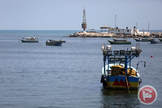
The Israeli authorities released two Palestinian fishermen, on Wednesday morning, who were detained a day earlier, off the coast of the northern besieged Gaza Strip.
Sources at the Palestinian liaison told Ma’an that the Israeli authorities released fishermen Issa al-Sharafi, 60, and his son Mahmoud, 30, via the Erez (Beit Hanoun) crossing.
The fishermen’s boat that was confiscated by Israeli forces during their detention remained in custody.
Meanwhile, Israeli forces opened fire at Palestinian shepherds near Erez.
A Ma’an reporter said that Israeli forces, deployed at military towers near Erez crossing, opened fire towards Palestinian shepherds.
No injuries were reported.
The Israeli army also regularly detains and opens fire on unarmed Palestinian fishermen, shepherds, and farmers along the border areas if they approach the buffer zone, as the authorities have not made clear the precise area of the designated zone.
The practice has in effect destroyed much of the agricultural and fishing sector of the blockaded coastal enclave, which has been under an Israeli air, land, and sea blockade for nearly 12 years.
According to Israeli human rights group B’Tselem, Israel’s Gaza siege and “harassment of fishermen” have been “destroying Gaza’s fishing sector,” with 95 percent of fishermen living below the poverty line.
Sources at the Palestinian liaison told Ma’an that the Israeli authorities released fishermen Issa al-Sharafi, 60, and his son Mahmoud, 30, via the Erez (Beit Hanoun) crossing.
The fishermen’s boat that was confiscated by Israeli forces during their detention remained in custody.
Meanwhile, Israeli forces opened fire at Palestinian shepherds near Erez.
A Ma’an reporter said that Israeli forces, deployed at military towers near Erez crossing, opened fire towards Palestinian shepherds.
No injuries were reported.
The Israeli army also regularly detains and opens fire on unarmed Palestinian fishermen, shepherds, and farmers along the border areas if they approach the buffer zone, as the authorities have not made clear the precise area of the designated zone.
The practice has in effect destroyed much of the agricultural and fishing sector of the blockaded coastal enclave, which has been under an Israeli air, land, and sea blockade for nearly 12 years.
According to Israeli human rights group B’Tselem, Israel’s Gaza siege and “harassment of fishermen” have been “destroying Gaza’s fishing sector,” with 95 percent of fishermen living below the poverty line.
1 jan 2019
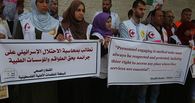
The Israeli naval forces on Tuesday morning kidnapped a Palestinian fisherman and his son and confiscated their boats off the northern coast of the besieged Gaza Strip.
Chief of the fishermen Nazzar Ayyash told the Palestinian Information Center (PIC) that the Israeli occupation state inaugurated the new year by kidnapping two fishermen.
The fishermen are Issa al-Sharafi, 60, and his son Mahmoud and they were kidnapped as they were on their boat off the shore of al-Sudaniya area in northern Gaza.
Ayyash said that the Israeli navy also seized the fishermen’s boat and fishing equipment.
The Israeli navy had arrested about 40 Palestinian fishermen off the coast of Gaza and confiscated more than 25 boats during 2018.
Israeli Naval Forces Arrest 2 Fishermen and Detain Fishing Boat Off Beit Lahia Shore in Northern Gaza Strip
On Tuesday, 01 January 2019, Israeli gunboats chased and opened fire at Palestinian fishing boats. They then arrested 2 fishermen and detained a fishing boat. This is part of the Israeli ongoing attacks against Palestinian fishermen and preventing them from sailing and fishing freely and accessing the fish-breeding areas in Gaza Sea.
According to PCHR’s investigations, at approximately 10:00 on Tuesday, 01 January 2019, Israeli gunboats stationed off al-Wahah Shore, northwest of Beit Lahia, chased fishing boats sailing within 6 nautical miles and opened fire at them.
A gunboat then intercepted a fishing boat manned by ‘Isa Ahmed Jamil al-Shrafi (68) and his son, Basil (28), who are both from al-Shati’ refugee camp in western Gaza City.
The Israeli naval soldiers then ordered the fishermen to take off their clothes, jump into the water and swain towards the gunboat.
They were arrested and taken to Ashdod Seaport in addition to detaining the fishing boat. At approximately 22:00 on the same day, the Israeli authorities released the two fishermen via Beit Hanoun “Erez” Crossing after interrogating them while the boat is so far under custody.
The Palestinian Center for Human Rights (PCHR) emphasizes that the Israeli naval forces’ attacks on the fishermen in the Gaza Strip are part the collective punishment policy against the Palestinian civilians and violate the right to work according to Article (6) of the International Covenant on Economic, Social and Cultural Rights. Thus, PCHR:
Public Document
**************************************
Follow PCHR on Facebook and Twitter
For more information, please call PCHR office in Gaza, Gaza Strip, on +972 8 2824776 – 2825893
Gaza- Jamal ‘Abdel Nasser “al-Thalathini” Street – Al-Roya Building- Floor 12 , El Remal, PO Box 1328 Gaza, Gaza Strip. E-mail: [email protected], Webpage http://www.pchrgaza.org
Chief of the fishermen Nazzar Ayyash told the Palestinian Information Center (PIC) that the Israeli occupation state inaugurated the new year by kidnapping two fishermen.
The fishermen are Issa al-Sharafi, 60, and his son Mahmoud and they were kidnapped as they were on their boat off the shore of al-Sudaniya area in northern Gaza.
Ayyash said that the Israeli navy also seized the fishermen’s boat and fishing equipment.
The Israeli navy had arrested about 40 Palestinian fishermen off the coast of Gaza and confiscated more than 25 boats during 2018.
Israeli Naval Forces Arrest 2 Fishermen and Detain Fishing Boat Off Beit Lahia Shore in Northern Gaza Strip
On Tuesday, 01 January 2019, Israeli gunboats chased and opened fire at Palestinian fishing boats. They then arrested 2 fishermen and detained a fishing boat. This is part of the Israeli ongoing attacks against Palestinian fishermen and preventing them from sailing and fishing freely and accessing the fish-breeding areas in Gaza Sea.
According to PCHR’s investigations, at approximately 10:00 on Tuesday, 01 January 2019, Israeli gunboats stationed off al-Wahah Shore, northwest of Beit Lahia, chased fishing boats sailing within 6 nautical miles and opened fire at them.
A gunboat then intercepted a fishing boat manned by ‘Isa Ahmed Jamil al-Shrafi (68) and his son, Basil (28), who are both from al-Shati’ refugee camp in western Gaza City.
The Israeli naval soldiers then ordered the fishermen to take off their clothes, jump into the water and swain towards the gunboat.
They were arrested and taken to Ashdod Seaport in addition to detaining the fishing boat. At approximately 22:00 on the same day, the Israeli authorities released the two fishermen via Beit Hanoun “Erez” Crossing after interrogating them while the boat is so far under custody.
The Palestinian Center for Human Rights (PCHR) emphasizes that the Israeli naval forces’ attacks on the fishermen in the Gaza Strip are part the collective punishment policy against the Palestinian civilians and violate the right to work according to Article (6) of the International Covenant on Economic, Social and Cultural Rights. Thus, PCHR:
- Calls upon the international community, including the High Contracting Parties to the 1949 Fourth Geneva Convention, to intervene to stop all Israeli violations against fishermen and allow them to fish freely in the Gaza Sea;
- Calls upon the Israeli authorities to stop chasing the fishermen and enable them to fish freely, especially that they do not pose threat to the Israel authorities; and
- Calls for releasing the fishing boats and equipment detained by them and compensate Palestinian fishermen for their losses due to the Israeli attacks.
Public Document
**************************************
Follow PCHR on Facebook and Twitter
For more information, please call PCHR office in Gaza, Gaza Strip, on +972 8 2824776 – 2825893
Gaza- Jamal ‘Abdel Nasser “al-Thalathini” Street – Al-Roya Building- Floor 12 , El Remal, PO Box 1328 Gaza, Gaza Strip. E-mail: [email protected], Webpage http://www.pchrgaza.org
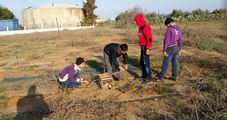
The Israeli occupation forces on Tuesday morning targeted Palestinian farmers and hunters in Rafah and Khan Younis, south of the blockaded Gaza Strip, with spates of gunfire.
Local sources said Israeli patrols opened gunfire at Palestinian farmers east of Rafah city.
At the same time, the occupation forces fired bullet spates toward Palestinian bird hunters and shepherds east of Khuza’a town, east of Khan Younis city.
The Israeli military routinely attacks farmers and civilians near Gaza’s border fence resulting in human and material damage.
Local sources said Israeli patrols opened gunfire at Palestinian farmers east of Rafah city.
At the same time, the occupation forces fired bullet spates toward Palestinian bird hunters and shepherds east of Khuza’a town, east of Khan Younis city.
The Israeli military routinely attacks farmers and civilians near Gaza’s border fence resulting in human and material damage.
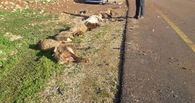
A Jewish settler driving at a high speed on Monday deliberately ran over a flock of sheep, killing 30 of them on a road in eastern Ramallah in the occupied West Bank.
Eyewitnesses reported seeing a settler speeding his car and ramming it into the sheep as a shepherd was herding them on Allon road in the east of Ramallah.
The sheep belong to local citizens from al-Mughayyir village in Ramallah.
Such vehicular attacks on Palestinian cattle in the West Bank have happened many times before.
Jewish settlers living in illegal settlements throughout the occupied West Bank tend to commit crimes against the Palestinian native population and their property since they know they will not be held accountable for their actions.
Eyewitnesses reported seeing a settler speeding his car and ramming it into the sheep as a shepherd was herding them on Allon road in the east of Ramallah.
The sheep belong to local citizens from al-Mughayyir village in Ramallah.
Such vehicular attacks on Palestinian cattle in the West Bank have happened many times before.
Jewish settlers living in illegal settlements throughout the occupied West Bank tend to commit crimes against the Palestinian native population and their property since they know they will not be held accountable for their actions.
Page: 2 - 1
